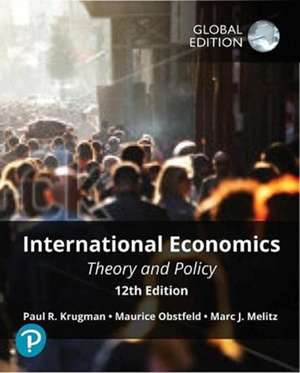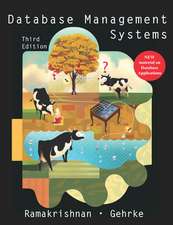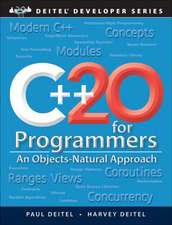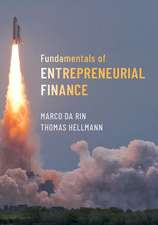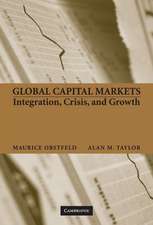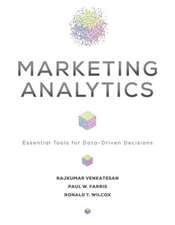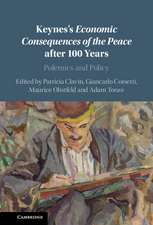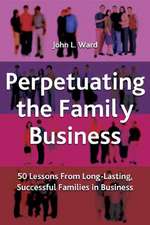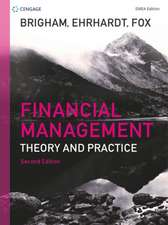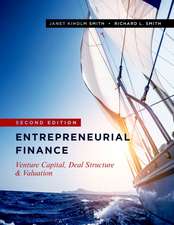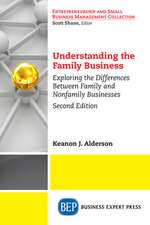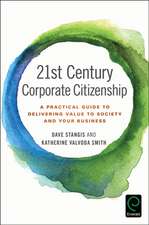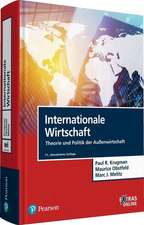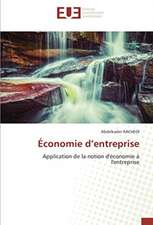International Economics: Theory and Policy, Global Edition
Autor Paul Krugman, Maurice Obstfeld, Marc Melitzen Limba Engleză Paperback – feb 2022
For courses in international economics, international finance, and international trade. A balanced, global approach to economic theory and policy applicationsInternational Economics: Theory and Policy provides engaging, balanced coverage of the key concepts and practical applications of theory and policy around the world. Divided into two halves, with the first devoted to trade and the second to monetary questions, the text provides an intuitive introduction to theory and events as well as detailed coverage of the actual policies put into place as a response.
In the 12th Edition, important economic developments are highlighted, with many lessons drawn from the recent COVID-19 pandemic experience. Using examples like these, the text equips students with the intellectual tools for understanding the changing world economy and economic implications of global interdependence.
Preț: 510.42 lei
Preț vechi: 586.69 lei
-13% Nou
97.66€ • 101.98$ • 80.65£
Carte disponibilă
Livrare economică 25 martie-08 aprilie
Livrare express 08-14 martie pentru 65.25 lei
Specificații
ISBN-10: 1292409711
Pagini: 824
Dimensiuni: 207 x 254 x 32 mm
Greutate: 1.52 kg
Ediția:12. Auflage
Editura: Pearson
Colecția Pearson Higher Education
Notă biografică
Paul Krugman, the recipient of the 2008 Nobel Memorial Prize in Economic Sciences, taught at Princeton University for 14 years. In 2015, he joined the faculty of the Graduate Centre of the City University of New York, associated with the Luxembourg Income Study, which tracks and analyses income inequality around the world.
In addition to his teaching and academic research, Krugman writes extensively for non-technical audiences and is a regular op-ed columnist for the New York Times.
Maurice Obstfeld is the Class of 1958 Professor of Economics at UC Berkeley. He joined Berkeley in 1989 as a Professor, following appointments at Columbia (1979-1986) and the University of Pennsylvania (1986-1989). He was also a visiting Professor at Harvard between 1989 and 1991.
From 2014 to 2015 he was a member of President Obama's Council of Economic Advisers, and from 2015 to 2018 served as Chief Economist at the International Monetary Fund.
Marc Melitz is the David A. Wells Professor of Political Economy at Harvard University. He holds a BA from Haverford College (1989), an MSBA from the Robert Smith School of Business (1992), and a Ph.D. from the University of Michigan (2000). He is a fellow of the Econometric Society and is affiliated with the National Bureau of Economic Research (NBER), the Centre for Economic Policy Research (CEPR), CESifo, and the Kiel Institute for the World Economy.
His broad research interests are in International Trade and Investment.
Cuprins
1. Introduction
PART ONE: INTERNATIONAL TRADE THEORY 2. Word Trade: An Overview 3. Labor Productivity and Comparative Advantage: The Ricardian Model 4. Specific Factors and Income Distribution 5. Resources and Trade: The Heckscher-Ohlin Model 6. The Standard Trade Model 7. External Economies of Scale and the International Location of Production 8. Firms in the Global Economy: Export and Foreign Sourcing Decisions and Multinational Enterprises
PART TWO: INTERNATIONAL TRADE POLICY 9. The Instruments of Trade Policy 10. The Political Economy of Trade Policy 11. Trade Policy in Developing Countries 12. Controversies in Trade Policy
PART THREE: EXCHANGE RATES AND OPEN-ECONOMY MACROECONOMICS 13. National Income Accounting and the Balance of Payments 14. Exchange Rates and the Foreign Exchange Market: An Asset Approach 15. Money, Interest Rates, and Exchange Rates 16. Price Levels and the Exchange Rate in the Long Run 17. Output and the Exchange Rate in the Short Run 18. Fixed Exchange Rates and Foreign Exchange Intervention
PART FOUR: INTERNATIONAL MACROECONOMIC POLICY 19. International Monetary Systems: A Historical Overview 20. Financial Globalization: Opportunity and Crisis 21. Optimum Currency Areas and the Euro 22. Developing Countries: Growth, Crisis, and Reform
